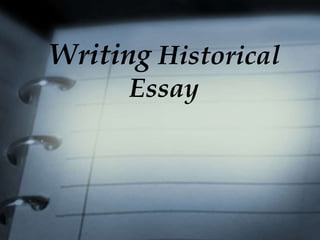How to Write a Compelling History Essay: Online Assignment Help
 Writing a history essay can be a rewarding endeavor if approached strategically. A well-crafted essay not only demonstrates your understanding of historical events but also showcases your ability to analyze and synthesize information effectively. Whether you are delving into ancient civilizations or modern political movements, this guide offers essential tips and strategies for crafting a compelling history essay.
Writing a history essay can be a rewarding endeavor if approached strategically. A well-crafted essay not only demonstrates your understanding of historical events but also showcases your ability to analyze and synthesize information effectively. Whether you are delving into ancient civilizations or modern political movements, this guide offers essential tips and strategies for crafting a compelling history essay.
Why History Essays Matter
History essays are more than a recounting of past events. They encourage critical thinking, contextual understanding, and the ability to argue effectively. Key benefits include:
- Analyzing Complex Relationships: Understanding the causes and effects of historical events.
- Improving Writing Skills: Presenting arguments clearly and persuasively.
- Cultivating Research Abilities: Evaluating primary and secondary sources critically.
Steps to Write an Effective History Essay
1. Understand the Essay Prompt
The first step to success is thoroughly understanding the question or prompt.
- Identify keywords like “analyze,” “compare,” or “evaluate.”
- Break down the question into manageable parts to address all aspects.
Example: “Analyze the causes and consequences of the American Revolution.” Here, focus on identifying causes, their impacts, and their interconnections.
2. Conduct Thorough Research
Quality research forms the foundation of any compelling history essay.
- Primary Sources: Include original documents, letters, speeches, or artifacts from the period.
- Secondary Sources: Leverage books, scholarly articles, and credible websites to gain insights.
Tip: Use academic databases like JSTOR or Google Scholar for reliable resources.
3. Develop a Clear Thesis Statement
Your thesis statement is the central argument or claim of your essay.
- Ensure it directly answers the prompt.
- Keep it concise but specific.
Example: “The American Revolution was driven by economic discontent and political grievances, ultimately reshaping the relationship between Britain and its colonies.”
4. Create a Strong Outline
A well-organized outline ensures your essay remains focused and logical.
- Introduction: Introduce the topic, provide background information, and state your thesis.
- Body Paragraphs: Each paragraph should explore a single point supporting your thesis.
- Conclusion: Summarize your main points and restate the thesis in light of your analysis.
Tips for Writing Each Section
Introduction
Grab the reader’s attention with an intriguing hook.
- Use a compelling quote, statistic, or question related to the topic.
- Provide necessary historical context to set the stage.
- End with a clear and concise thesis statement.
Example: “‘Taxation without representation is tyranny.’ This rallying cry encapsulated the American colonists’ discontent and set the stage for a revolution that reshaped the modern world.”
Body Paragraphs
Each paragraph should follow a structured format:
- Topic Sentence: Introduce the main idea of the paragraph.
- Evidence: Support your argument with facts, quotes, and data from your research.
- Analysis: Explain the significance of the evidence and how it supports your thesis.
- Transition: Link to the next paragraph to maintain flow.
Example:
“Economic factors played a pivotal role in fueling the American Revolution. The imposition of the Stamp Act of 1765 not only increased financial burdens on the colonies but also sparked widespread protests, as evidenced by the formation of the Sons of Liberty.”
Conclusion
Your conclusion should provide closure while reinforcing your argument.
- Restate the thesis in different words.
- Summarize the main points of your essay.
- Leave the reader with a thought-provoking remark or question.
Example: “The American Revolution was more than a struggle for independence; it was a transformative movement that redefined governance and liberty. Understanding its causes and consequences offers valuable lessons on the power of collective action.”
Common Pitfalls to Avoid
- Lack of Focus: Stick to the thesis and avoid tangential topics.
- Weak Evidence: Use credible sources and cite them properly.
- Poor Organization: Follow a logical structure to ensure clarity.
- Overloading Facts: Balance factual information with analysis and interpretation.
Polishing Your History Essay
1. Proofread for Grammar and Style
Eliminate errors in spelling, grammar, and punctuation.
- Use tools like Grammarly or Hemingway Editor for assistance.
2. Check Citations
Proper citation is critical in history essays.
- Use formats like APA, MLA, or Chicago, as required.
- Include footnotes or a bibliography for references.
3. Refine Your Argument
Revisit your thesis and ensure all evidence supports it effectively.
4. Seek Feedback
Share your essay with peers, instructors, or online assignment help services for constructive feedback.
The Role of Online Assignment Help
Online student assignment help platforms can provide valuable support for history essays by:
- Offering expert guidance on essay structure and content.
- Assisting with research and citation management.
- Providing personalized feedback for improvement.
For example, platforms like EssayResearchScholar.com connect students with professional historians and writers to enhance essay quality.
Conclusion
Writing a compelling history essay requires a combination of research, critical thinking, and effective communication. By understanding the prompt, developing a clear thesis, and organizing your essay logically, you can create an impactful narrative that showcases your historical knowledge.
Remember, quality essays take time to craft. Leverage resources like EssayResearchScholar.com online assignment help services to refine your work and meet academic standards. With dedication and strategic effort, you can master the art of history essay writing and excel in your academic pursuits.
